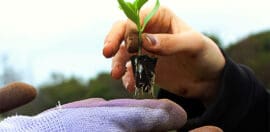Stepping up and thinking quick: 2020 philanthropy in review

22 December 2020 at 8:18 am
We shine a light on the biggest philanthropic moments and gifts from across 2020
In a year characterised by never-ending and unprecedented challenges that devastated the lives of millions globally and the organisations that support them, philanthropy had a big role to play.
It was a role that required big dollars, quick thinking, and at times completely flipping the way philanthropy operated. We take a look at the year that was.
The blaze and the panic
The start of 2020 for many Australians was spent under a shroud of smoke and fire, as catastrophic bushfires ripped across the country and destroyed thousands of acres of bushland, animal habitats, and livelihoods.
It didn’t take long for some of the country’s biggest philanthropic names to jump into action and dig deep. Western Australian mining billionaire Andrew “Twiggy” Forrest and his wife Nicola announced a $70 million bushfire relief package. The money was split between deploying a volunteer workforce to rebuild affected communities, charities working on the frontline, and a plan to develop new approaches to mitigating the threat of bushfires.
Around the same time, The Paul Ramsay Foundation (who once again topped this year’s Philanthropy 50 List) pledged $3 million to the Red Cross, the Foundation for Rural and Regional Australia, and St Vincent de Paul Society for immediate relief efforts, and $27 million for longer-term work rebuilding disadvantaged communities.
And John and Pauline Gandel donated $1 million through their charitable entity, Gandel Philanthropy, to support volunteer firefighting organisations across the country, and charity appeals aiding people, communities, wildlife and the environment.
An unlikely philanthropic hero also emerged during this period. Comedian Celeste Barber made headlines when she set up a Facebook fundraiser (with an initial target of $30,000) and raised a whopping $51 million from about $1.3 million donors.
But the fundraiser for the Trustee for NSW Rural Fire Service was later caught up in legal complications when it was revealed that the donations could not be spread between frontline organisations.
According to Jodi Kennedy, general manager of philanthropy at Equity Trustees, while philanthropy was used to dealing with and funding disaster situations, the catastrophic nature of the 2020 summer bushfires was something the sector just wasn’t prepared for.
“There was a lot of confusion from funders in those first couple of months of the year, because they just really didn’t know how and where to direct their funding,” Kennedy told Pro Bono News.
“I think we all got caught off guard but I do think that we’ve now put in place systems and processes and things so that we are ready to go fundraising the second another disaster hits.”
Coronavirus hits Australian shores
It was not long after the bushfires seemed under control that the next disaster hit. By March, COVID-19 had quickly spread across the globe and found its way to Australian shores.
The outbreak of the pandemic had disastrous effects on the economy, vulnerable communities, and the organisations that supported them.
Community organisations were not only dealing with extreme financial uncertainty and a reduced workforce capacity, but a spike in demand for services. Philanthropy was quick to respond in a variety of ways.
At the end of March, the Forrests’ Minderoo Foundation pledged $160 million to fly in specialist medical supplies from China, the Macquarie Group allocated $20 million to the Macquarie Group Foundation to build a fund to help organisations working to combat COVID-19, and the Paul Ramsay Foundation put $9 million towards finding a vaccine for the virus.
Not just more philanthropy, but better philanthropy
As charities continued to struggle through the pandemic, the sector responded by flipping its approach to philanthropy.
In April, several prominent philanthropic funders – including The Snow Foundation, The Myer Foundation and Sidney Myer Fund, and Macquarie Group Foundation – signed onto a new public statement from Philanthropy Australia to adopt 11 key principles within their own funding context that would help grantees and partners through the uncertainty of COVID-19.
Some of the key principles included reducing or removing restrictions on current grants, adopting more flexible reporting arrangements, maintaining or increasing grant funding, and offering funding loans and impact investments.
Philanthropists were also given a further incentive to dig deep for struggling charities, with the government announcing in May that public and private ancillary funds will be given a credit if they make total distributions in 2019-20 and 2020-21 that are at least four percentage points above the minimum required level.
In the months following, grant makers were found to be putting their money where their mouths were.
A survey released by Philanthropy Australia in June found that out of 101 grantmakers, 88 per cent of respondents had already changed the way they support charities during the pandemic, increasing flexibility in funding (72 per cent), untying restricted funding (48 per cent), increasing financial grant support (42 per cent), and setting up dedicated COVID-19 programs (32 per cent).
Equity Trustees was among the many organisations that pivoted their services during this time.
“We basically unlocked a lot of funding that had been allocated to other things, put it all into a pot and did a specific COVID-19 rapid response granting round,” Kennedy said.
It wasn’t all smooth sailing however. Many grantmakers reported struggling with the pace of emergency grantmaking amid the uncertain COVID-19 environment.
But for Krystian Seibert, an industry fellow at the Centre for Social Impact at Swinburne University and the acting policy and research officer at Philanthropy Australia, the change in approach to grant making was one of the most important parts of the philanthropy response to the pandemic.
I think 2020 was a really important year for Australian philanthropy’s evolution – it was great to see funders responding quickly and flexibly, really listening to partners and understanding their needs, and shifting grants towards general operating support.”
“There was a strong realisation that charities and of course communities were really doing it tough and that while governments obviously have a key role to play in terms of providing support, philanthropy needs to step up as well, and I believe that the sector took this responsibility very seriously.”
Building back better
For Sarah Davies AM, who finished up as CEO of Philanthropy Australia last week, it’s a year that has seen and encouraged the best of Australian philanthropy.
In a farewell blog published for Philanthropy Australia she said that whilst she would never wish for a repeat of this year, “it has pushed us to be better and do better.”
These challenges were something that sector leaders were recognised for in this year’s Philanthropy Australia awards.
Time will only tell whether or not philanthropy adopts these emergency changes for good, but it’s something that Kennedy said is at the front of funders’ minds.
“Rather than just funding programs, how do we fund the sector to build themselves back better?” Kennedy said.
“Capacity building from a major funders perspective is going to be critical moving forward, because we have the larger amounts of money and none of these problems are small problems to solve.”








